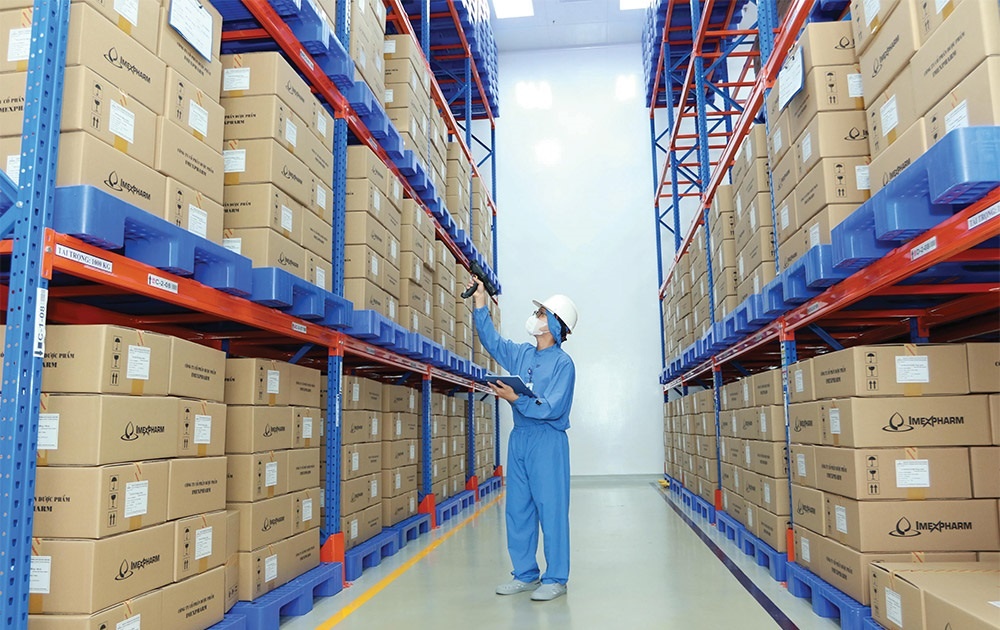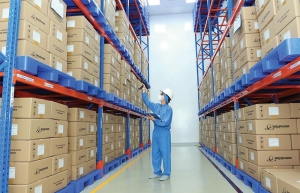Logistics promise for foreign investors
Experts believe the logistics industry could account for up to 20 per cent of the country’s GDP by 2050, making it one of the most lucrative areas for international investment. Several trends are driving the growth, and understanding these dynamics is essential for foreign businesses aiming to capitalise on Vietnam’s thriving logistics market.
 |
| Thomas Zagler, partner in Vietnam for Asian Insiders |
According to Mordor Intelligence, the logistics market in Vietnam was valued at approximately $45.2 billion in 2023 and is projected to expand to over $65 billion by the end of the decade. This rapid growth has attracted foreign businesses, particularly those looking to invest in Asia.
E-commerce has been the primary catalyst for the boom in logistics. Vietnam’s five largest online retail platforms – Shopee, Lazada, Tiki, Sendo, and TikTok Shop – reported combined sales of $2.79 billion in the first quarter of 2024, and sales climbed to $3.3 billion in the second quarter.
Estimates suggest that more than 750 million products were purchased through e-commerce platforms during the first three months of 2024. This surge in online shopping has generated significant demand for logistics services, as goods must be stored, managed, and delivered to consumers.
Interestingly, e-commerce growth is no longer limited to Vietnam’s largest cities. Rural areas are also witnessing a sharp rise in online shopping. The country is expected to have 67 million smartphone users by 2026, further fuelling the demand for logistics services across all regions. With this shift, online retailers are increasingly catering to rural customers, making Vietnam’s logistics sector essential to the country’s e-commerce-driven economy.
Several strategic advantages make Vietnam an appealing logistics hub for foreign investors. Firstly, the country’s position within the ASEAN Economic Community provides businesses with access to a vast regional market. Vietnam has also secured key free trade agreements. Vietnam is one of only two ASEAN countries to have such an agreement with the European Union, providing a unique opportunity for businesses to gain a foothold in both Asian and European markets.
Furthermore, Vietnam benefits from relatively low operating costs. According to business consultancy TMX, the country enjoys the second-lowest warehouse operating costs in Southeast Asia, which has drawn the attention of foreign companies seeking to expand their logistics operations.
Foreign interest in logistics
Warehousing has become a focal point for foreign investors in Vietnam’s logistics sector. Research from FiinGroup shows that international developers control almost three-quarters of the country’s leasable warehouse space. Key players include Singapore’s Mapletree, Warburg Pincus-backed BW Industrial, and GLP Capital’s SEA Logistic Partners. These companies have successfully leveraged their expertise in logistics and warehousing to help Vietnam meet its increasing storage needs.
The warehouse sector initially attracted limited competition due to the high initial capital investments required. However, more foreign developers have entered the market, recognising the growing demand for warehouse space from e-commerce firms, manufacturers, and outsourced logistics providers.
Alongside warehousing, outsourced logistics services have gained attention from foreign investors. Two types of companies are in particularly high demand: third-party logistics (3PL) and fourth-party logistics (4PL).
A 3PL firm handles one or more specific tasks in the supply chain process, such as transportation or storage. A 4PL company, on the other hand, oversees the entire logistics operation for its clients. While 3PL services remain popular in Vietnam, many companies are now turning to 4PL providers for a more streamlined logistics solution.
Perhaps the most promising area for foreign investors is cold chain logistics, which is essential for handling Vietnam’s extensive exports of fruits, vegetables, seafood, and pharmaceuticals. Despite the country’s reliance on these industries, cold chain logistics remains underdeveloped, creating a significant investment opportunity.
There is an urgent need for both cold storage facilities and transportation services. Cold chain logistics face relatively little competition in Vietnam, but the sector is challenging. Building cold storage warehouses is significantly more expensive than traditional storage facilities, with cold storage units costing up to three times as much to construct. These facilities also have a shorter lifespan and are more complex to operate, which has deterred some investors. However, the potential for higher returns in this sector makes it an attractive option for companies willing to invest.
Vietnam’s attractiveness to foreign investors in the logistics sector can be further enhanced by focusing on a few key areas. Firstly, ongoing improvements to the country’s infrastructure are vital. While Vietnam has made notable progress in building expressways and upgrading ports, there is still work to be done to ensure smooth, countrywide connectivity for goods.
Reports of congestion at some ports and airports suggest that Vietnam’s infrastructure needs further development to meet growing logistics demand. Ensuring the free movement of goods across all regions of the country will be particularly important as e-commerce spreads from major cities to rural areas.
Recognising the importance of logistics, the Vietnamese government has taken steps to address logistical bottlenecks. Resolution No.163/NQ-CP tasks relevant ministries with reducing costs and removing hindrances to cross-border transportation. The Ministry of Transport is working to improve multimodal links, including rail and road systems, which are critical for the industry’s growth.
Reducing regulatory barriers is also essential for encouraging foreign investment. Decree 163, introduced in 2018, was a step in the right direction, but more can be done to streamline procedures and simplify regulations for logistics firms.
Sustainability and green logistics practices are another area of growing interest for foreign investors. Many international companies have sustainability targets they must meet, and they are looking for countries like Vietnam to provide solutions. The demand for warehouses equipped with renewable energy sources and infrastructure for electric vehicles is expected to rise in the coming years.
Lastly, there is a shortage of skilled labour in Vietnam’s logistics sector, particularly for higher-level positions. Addressing this issue through education and training initiatives will be essential for maintaining the sector’s momentum.
 |
| Alongside warehousing, outsourced logistics services have gained attention from foreign investors |
The road ahead
In the coming years, warehousing will remain a key area of focus for foreign investors, with demand for space expected to rise significantly. E-commerce alone could grow by up to 30 per cent annually through the end of the decade, further increasing the need for logistics services.
However, the rapid pace of warehouse development carries the risk of oversupply, which could negatively impact rental prices. This is not yet a concern, but industry players should monitor the situation to avoid market imbalances.
Aside from warehousing, other specialised areas like cold chain logistics offer untapped potential for investors. Companies with experience in supply chain optimisation and technologies that improve efficiency will be highly sought after in the coming years.
At the same time, foreign investors are likely to steer clear of overly competitive sectors like last-mile delivery, where shrinking profit margins have deterred some companies. While a few foreign firms have entered this space, many have adopted a “wait and see” approach, betting on long-term success despite short-term challenges.
Vietnam’s logistics sector holds immense promise for foreign investors, but navigating the opportunities will require overcoming certain challenges. Continued infrastructure development, regulatory improvements, and a focus on sustainability will be key to attracting more investment in the years ahead. For investors with a long-term perspective, Vietnam’s rapidly growing logistics market offers considerable potential for growth and profit.
| Vietnam Logistics Summit 2024 The second Vietnam Logistics Summit, themed “Transform to Breakthrough”, will take place on Thursday, October 31 at JW Marriott Saigon Hotel in District 1 of Ho Chi Minh City. With the participation of more than 300 domestic and international participants, the event, which will be held by Vietnam Investment Review under the auspices of the Ministry of Planning and Investment, will analyse the most pressing issues of the logistics industry such as new trends, modernising infrastructure, enhancing supply chain efficiency, promoting digital transformation, and developing new business models. Information about the forum will be reported on VIR’s online platforms and regularly updated at www.logsummit.vir.com.vn |
 | Navigating turbulence in logistics and supply chains In 2024, Vietnam’s logistics and supply chain sector showcased remarkable resilience amidst an array of challenges, painting a complex picture of recovery, adaptation, and potential growth. Despite the hurdles, the sector has maintained a trajectory that promises gradual improvement, though not without facing significant setbacks that test its stability and future prospects. |
 | Alignment with EU can address logistics issues Despite the growth in trade turnover so far this year, import and export activities between Vietnam and the EU continue to face unpredictability, a fragile recovery of consumer demand, and knock-on effects of geopolitical strife. |
 | Green Logistics is gaining traction to reduce greenhouse gas emissions Chairman and CEO Jareeporn Jarukornsakul of WHA Corporation Public Co., Ltd. delves into green logistics as companies look to slash greenhouse gas emissions and make the sector more sustainable. |
What the stars mean:
★ Poor ★ ★ Promising ★★★ Good ★★★★ Very good ★★★★★ Exceptional
Related Contents
Latest News
More News
- Citi economists project robust Vietnam economic growth in 2026 (February 14, 2026 | 18:00)
- Sustaining high growth must be balanced in stable manner (February 14, 2026 | 09:00)
- From 5G to 6G: how AI is shaping Vietnam’s path to digital leadership (February 13, 2026 | 10:59)
- Cooperation must align with Vietnam’s long-term ambitions (February 13, 2026 | 09:00)
- Need-to-know aspects ahead of AI law (February 13, 2026 | 08:00)
- Legalities to early operations for Vietnam’s IFC (February 11, 2026 | 12:17)
- Foreign-language trademarks gain traction in Vietnam (February 06, 2026 | 09:26)
- Offshore structuring and the Singapore holding route (February 02, 2026 | 10:39)
- Vietnam enters new development era: Russian scholar (January 25, 2026 | 10:08)
- 14th National Party Congress marks new era, expands Vietnam’s global role: Australian scholar (January 25, 2026 | 09:54)

 Tag:
Tag:















 Mobile Version
Mobile Version